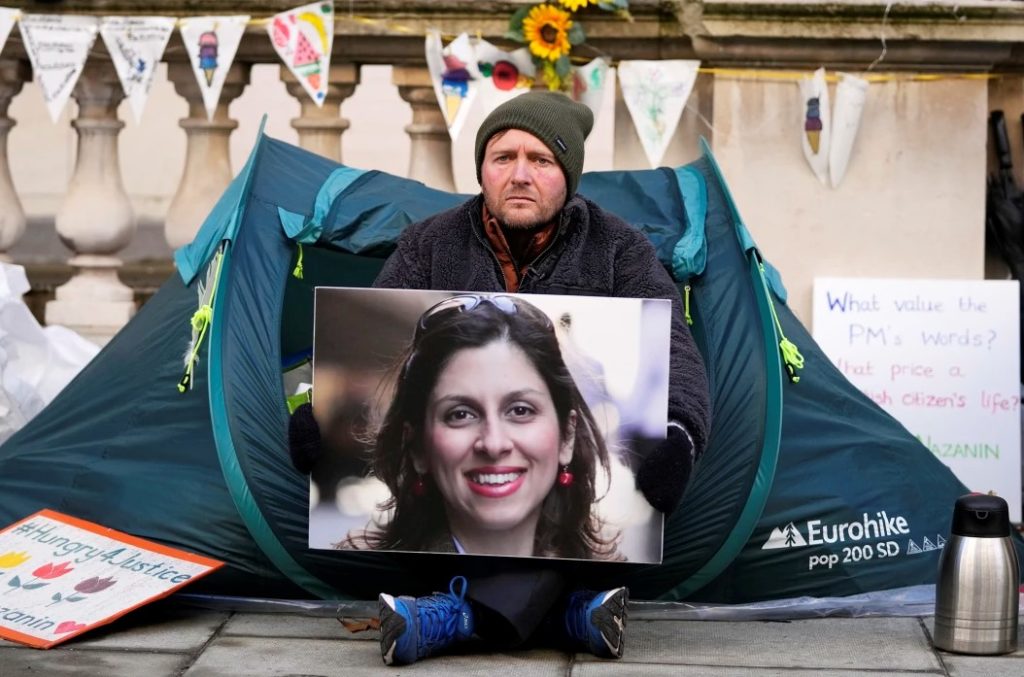November 19, 2021

A frustrated Richard Ratcliffe, seeing no progress in efforts to free his wife from the clutches of the Islamic Republic, went on a hunger strike for 21 days this month, living in a tent outside the British Foreign Office in London as the temperature sank.
This is the second time Ratcliffe has gone on a hunger strike in an effort to draw attention to the continuing detention in Tehran of his wife, Nazanin Zaghari-Ratcliffe. The first time, 2019, he lasted 15 days. This time, he stretched it to 21 days and clearly was worn to a frazzle.
Ratcliffe’s encampment drew considerable attention from the public and from many members of Parliament, who dropped by to see him—and to be seen with him.
He also met with James Cleverly, a junior foreign minister, to hear details of the talks Cleverly had with Iran’s visiting deputy foreign minister, Ali Bagheri-Kani, the man who will lead the Iranian team in the soon-to-be resumed nuclear talks.
Ratcliffe was not happy with what he heard.
“If I’m honest, quite a depressing meeting,” Ratcliffe said. “I had hoped there would have been some kind of a breakthrough and recognition in the meeting with Iran — maybe that will be happening away from us, but I don’t have any hopes.”
Ratcliffe began his demonstration last month after his wife lost her latest appeal in Iran. He had been sleeping in a tent outside the Foreign Office’s main entrance in an effort to pressure the British government to secure the release of his wife and other detained dual British-Iranian nationals.
“I think there’s a basic medical limit on how long you do a hunger strike for,” Ratcliffe said. “I made a promise to Nazanin, I made a promise to my family, mum in particular, and to the family doctors, that I won’t take it too far.”
Finally, he got pains in his feet one night and a discussion with physicians the next morning convinced him to end his strike. He tweeted: “Today I have promised Nazanin to end the hunger strike. Gabriella [their seven-year-old daughter] needs two parents.” He then went to a hospital for a medical checkup.
He said of his hunger strike, “We probably hoped to get a breakthrough doing this. We haven’t yet. I didn’t want to go out in an ambulance. I want to walk out with my head held high.”
Zaghari-Ratcliffe served four years in prison after being taken into custody at Tehran’s airport in April 2016 and convicted of plotting the overthrow of Iran’s government, a charge that she, her supporters and rights groups deny.
In May, she was sentenced to an additional year in prison on charges of spreading “propaganda against the system” for having participated in a protest outside the Iranian Embassy in London in 2009 — a decision upheld this month by an appeals court. The verdict includes a one-year travel ban, meaning she wouldn’t be able to leave Iran until 2023.
Zaghari-Ratcliffe was employed by the Thomson Reuters Foundation, the charitable arm of the news agency.
Ratcliffe said his wife is being used as “leverage” by Tehran, specifically with regard to the UK’s failure to pay an outstanding 400 million-pound ($540 million) debt to Iran. Britain acknowledges owing the money for tanks the Shah had ordered that were not delivered after the revolution. But Britain has said it cannot make any payments now because of sanctions.
“We asked about the debt and they wouldn’t talk about it, I mean really clammed up,” he said of the meeting with Cleverly.
Meanwhile, former Foreign Secretary Jeremy Hunt said it was important that Britain pay off the debt quickly. “This is not ransom money,” he said. “This is a debt. An international court has said so. The defense secretary has said so. We should pay it because it is an irritant to relations.” He did not say why he did not pay it off when he was foreign secretary in 2018-2019.
Ratcliffe said Cleverly wanted to emphasize that the meeting with the Iranian delegation had been “cordial.”
“But, you know, we’re still stuck in the same status quo,” he said. “I don’t feel they’ve given a clear enough message to Iran that hostage-taking is wrong. I don’t think there are any consequences to Iran at present for its continuing taking hostages of British citizens and using them.”
Zaghari-Ratcliffe is one of four British-Iranian dual nationals detained in Iran. Roya Saberi Negad-Nobakht was arrested in October 2013, apparently for a Facebook comment she made observing that Iran had become too Islamic. She was freed from prison in August 2017, but apparently is still not allowed to leave Iran. Zaghari-Ratcliffe was next arrested in April 2016. She was allowed to leave prison in March 2020 and has been staying at her parents’ home since then. She has not been ordered back to prison since her second conviction. Anush Ashoori, arrested in August 2017, and Morad Tahbaz (who also holds US citizenship), arrested in January 2018, are the only two British nationals still known to be held in prison. Ashoori is serving 12 years and Tahbaz 10 years on conviction for espionage.